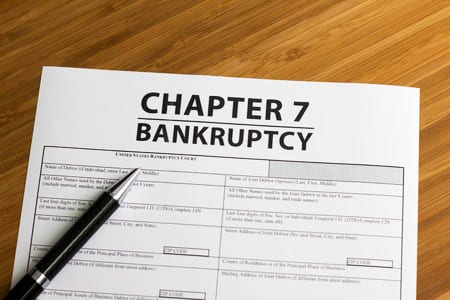BANKRUPTCY LAWYER QUESTION FROM ST PETERSBURG, FLORIDA
 What is a Chapter 7 Bankruptcy asks St Petersburg, Florida Resident Mr. O. Chapter 7 Bankruptcy is a Bankruptcy formed under Chapter 7 of the Bankruptcy Code.
What is a Chapter 7 Bankruptcy asks St Petersburg, Florida Resident Mr. O. Chapter 7 Bankruptcy is a Bankruptcy formed under Chapter 7 of the Bankruptcy Code.
Generally, a Chapter 7 Bankruptcy is filed by a Debtor seeking to Discharge or eliminate Unsecured Debt, such as Credit Cards, Medical Bills, Deficiencies on Home or Automobile Loans, Signature Loans, and other Debts classified as Unsecured. A Debt is Unsecured if it is not Secured by any form of Collateral.
A Mortgage on a Home or an Automobile Loan is generally a Secured Debt because the Collateral, namely the Home or Automobile, Secures the Loan. The pledge of Collateral gives the Lender the opportunity to seize or take the Collateral if the Debtor does not tender payments according to the terms of the Loan.
If a Debtor has an Automobile Loan, then the loan is Secured or Liened by the Automobile. If the Automobile is seized by the Creditor, and the Debtor no longer has possession of the Automobile, then the Loan is an Unsecured Debt, because there is no remaining Collateral.
Chapter 7 Bankruptcy is sometimes helpful for a Debtor who has Debt owed to a Taxing Entity, such as Income Taxes owed to the Department of the Treasury. If certain Tax Debts are over three years old, the Debtor has filed his Taxes more than two years ago, the Debt is not Secured, there are no recent Offers In Compromise, and other considerations, that Debt may be eligible for Discharge in a Chapter 7 Bankruptcy.
Student Loans under limited circumstances, may be eligible for Discharge in a Chapter 7 Bankruptcy. Generally, in order to achieve a Discharge, the Debtor must show that the Debt creates an Undue Hardship. A number of factors are used in determining whether a Debtor may accomplish a Discharge of Tax Debt, including the Debtor’s course of study, the likelihood the Debtor will be able to work in his or her chosen field, whether the Debtor graduated from whatever Educational Institution he or she attended, whether the Debtor made an attempt to repay the Student Loan, and other factors.
There is no limit as to the amount of Debt a Debtor may have in order to qualify for a Chapter 7 Bankruptcy. However, if the Debtor has Income that exceeds the Median Income, as determined by Family or Household Size, in the District in which he or she files, the Debtor may not be eligible to file a Chapter 7 Bankruptcy. The Debtor may be eligible to file a Chapter 13 Bankruptcy, or another form of Bankruptcy.
A Debtor may generally file a Chapter 7 Bankruptcy every 8 years. The 8 year period is determined from the date of the filing of the previous Bankruptcy. If a Debtor filed Chapter 7 Bankruptcy on January 1, 2016, then he or she would be enjoined from filing another Bankruptcy and seeking a Discharge, until January 1, 2024.
When a Debtor files Chapter 7 Bankruptcy, he or she has access to what are called Exemptions. Depending upon where the Debtor files and lived previously, the Debtor will be able to use either State Exemptions or Federal Exemptions. Exemptions are Assets that either the State or Federal Legislatures have determined that are essential for the Debtor to retain if he or she files Bankruptcy, or is subject to a Lawsuit by a Creditor.
For example, in the State of Florida, there is a Homestead Exemption. The State of Florida has determined that it is in the States interest, and possibly the interest of its Residents, that such Residents are not removed from their Homes because of a Bankruptcy filing or a Creditor Lawsuit. Homeless people create more of a drain on the resources of the State than persons secure in their Homes. Such a Law also serves one of the generally stated purposes of the Bankruptcy Laws; to enable the Debtor to obtain a “fresh start”.
This is a heavily abbreviated description of Chapter 7 Bankruptcy. If you are considering whether to file Chapter 7 Bankruptcy, are am seeking representation in any form of Bankruptcy Proceeding, please contact our Office. Weller Legal Group has been representing the Tampa Bay Region in Bankruptcy Matters since 1993. We are the oldest, established, and continuing Bankruptcy Law Firm in the Tampa Bay area, and have Offices in Clearwater, Port Richey, Brandon and Lakeland. If you are in need of assistance, please do not hesitate to contact our Office.

